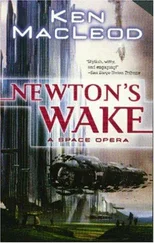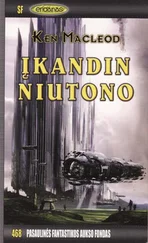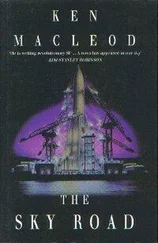We flew in an irregular spiral, perhaps to avoid stair-ladders and other obstacles invisible to me, but always up. I looked down, at the ground. I could see houses and vehicles, but not people. Other small aircraft buzzed about the sky, at what seemed frighteningly short clearances. The air felt thinner as we climbed. As we levelled out I could feel the sunline hot on my shoulders, bright out of the corners of my eyes. Ahead loomed the forward wall. Featureless from the distances at which I had always seen it, it now looked complex, with gigantic pipes snaking across it and great clusters of machinery clamped to it. Wheels turned and pistons and elevators moved up and down. Rectangular black slots became visible, here and there on the surface, and we flew towards one. As naively as I’d thought I could climb to the sunline, I’d imagined we would fly to it, but we flew into the slot — it was two hundred metres wide by at least thirty high — and landed. Other small aircraft were parked in the artificial cavern. It was in fact a hangar. Constantine helped me out of the seat. My memory may be playing tricks, but I fancy I felt slightly lighter.
“I thought we were going to fly all the way,” I said, trying not to sound querulous.
“The air doesn’t go all the way to the sunline,” Constantine told me. “So we will take the lift.”
I followed him across the broad floor to an inconspicuous door. Behind it was an empty lift, big enough to hold about a dozen people. Its walls were transparent, giving a view of a dark chasm within which gigantic shapes moved vertically, illuminated by occasional random lights. The doors hissed shut and the lift began to ascend. So rapid was its acceleration that my knees buckled. Constantine grasped my shoulder.
“Steady,” he said. “It doesn’t get worse than carrying someone piggyback.”
Vaguely affronted, I straightened up and stared out. Looking down made me dizzy, so I looked up. The space in which we moved was in fact quite shallow in relation to its size. We were headed for a bright spot above, which I knew to be some manifestation of the sunline. The lift decelerated far more gradually and gently than it had accelerated. As it did so, I found that I was becoming lighter. An experimental downward thrust of the toes sent me a metre into the air. I yelled out, startled and delighted, as I fell back.
Constantine laughed. “Hold the bar,” he said.
The lift halted, as if hesitating, then shot upward again. We passed through a hatch or hole. For a moment I was pressed against the wall of the lift; then I found myself weightless. Constantine glided over my head, twisting and somersaulting at the same time. I let go of the bar, flailing. The sensation of falling was for a moment terrifying. My stomach heaved, then settled.
“It’s all right,” he said. “We’re in the forward cone now.” The teeth of his smile were a vivid white. He caught my elbow and swung me onto his back. I gripped fistfuls of fabric at his shoulders and clung. He grinned sideways at me and kicked off. The door of the lift hissed open. My eardrums clicked. We skimmed above the floor of a long tube. Shafts of light stabbed down from small holes or windows above us; my eyes adjusted quickly to the dimness, not darker, in truth, than indoor lighting. About three metres high by two wide, the tube ran straight into the distance as far as I could see. Within it, as we moved along, I noticed many other corridors branching off. Constantine’s foot flicked at a wall and we hurtled into one of these side corridors. There was a smell of earth and ozone, of plant and animal and machine. Rapidly and bewilderingly, we passed through a succession of corridors and chambers, within which I glimpsed machinery and instruments, gardens hanging in midair, glowing lights and optical cables, and many people flying or floating or scuttling like monkeys along tubes or flimsy ladders. And what strange people they were, long of limb and lithe of muscle and wild of hair. Naked as the day they were born, lots of them; or looking similar, but in bright-coloured skintight suits; others crusted with stiff sculptured garments, like the camouflage of a leaf insect, or swathed in silky balloon sleeves and pants. Their indifference to orientation was for me disorienting; looking at their antics I felt a resurgence of unease in my belly.
I closed my eyes, and when I opened them again we had reached our destination. We floated near the floor of the biggest enclosed space I’d ever been in, apart from the world itself. The floor was smooth, and extended far ahead of us, and curved up on either hand like a smaller version of the curve of the world. Up and down had in a manner been restored. The thing that I craned my neck to look at, from my vantage on Constantine’s back, was unmistakably up . Above us it vanished into shadows, ahead it stretched and tapered into distance. A thousand or more metres long, hundreds of metres high, it was complex, flanged, fluted and voluted, yet seemed cast from a single block of metal, ancient and pitted as an iron asteroid. There was one piece of metal, however, that shone bright and distinct from the rest: a metre-long rectangle of burnished brass, on which some writing was engraved. We hung in the still, rust-scented air not an arm’s length from it. The inscription was as follows:
Sunliner But the Sky, My Lady! The Sky!
Forged this day 6 February 10 358 AG.
Constantine reached around and disengaged me from his back. We drifted for a few minutes, hand in hand.
“I never knew the world had a name,” I said.
“I named it,” said Constantine.
“Why did you call it that?” I asked.
He swung me and caught my other hand, like a dancer, and once again gazed into my face as if looking for something.
“You’ll know one day,” he said.
I know now.
Horrocks Mathematical blinked away the girl’s biolog. It seemed that like all of the ship generation she was maturing on schedule. He himself had gone through adolescence, five or six years ago now, without any such epiphany. The Mathematical were tenth-generation crew and Horrocks had never had to suffer a grounded upbringing. Although born in the ship he did not consider himself or his cohort part of the ship generation. They were among the youngest members of the crew, that was all. Through the foliage of the air-tree and the skin of the bubble in which he floated he could see the land twenty-five kilometres below — its parks and copses, rivers and lakes, estates and towns an ideal of savannah and suburbia that was said to be a hard-wired part of the human evolutionary heritage, though only manifested among flatfooters. As a free-flyer, Horrocks felt that his was a more evolved biophilia.
The air-tree, growing from a hydroponic tank, its branches grafted to form an open wickerwork sphere, was about fifty metres in diameter and five years older than he was. Horrocks pushed through the lianas that crisscrossed its interior and thrust himself out into the greater confinement of the bubble. He had work to do. The bubble was one of scores strung on a circular cable around the sunline like beads on a bangle. The cable contra-rotated the ground, putting the bubbles in an approximation of free fall. Only the slight intermittent backward tug of the small jets that countered the effect of the ship’s deceleration broke the spell, but that was all they broke.
On the other side of the bubble, making a rocky counterpart to the air-tree, hung a tethered lump of asteroid clinker about a hundred metres across. A thrust of his feet took Horrocks towards it. As he drifted he tugged on his cuffs. The fabric slid over his hands and fingers, to form tough gloves by the time he impacted the rock’s side. He worked his way over and around the rock, checking each of the scores of machines he’d spent the past few days bolting to its surface. They jutted out a metre or so; their display and control panels — some of them simple touch screens, others elaborate but rugged arrangements of knobs, push buttons, and dials, and a few remote brain interfaces — were already filmed or crusted with dust. All in order, however. The tenebrific shade had passed over him many times, and half the morning had passed, before he was satisfied with that.
Читать дальше












